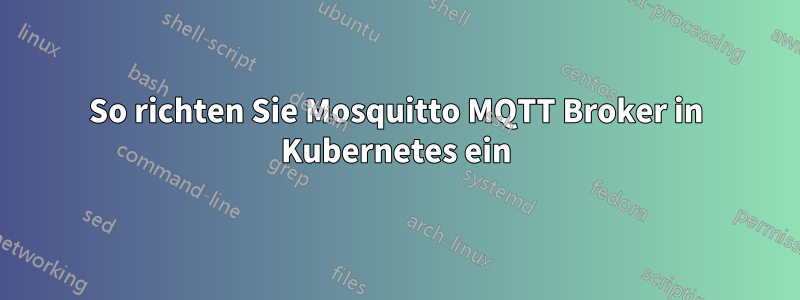
Ich habe versucht, ChirpStack in einem Kubernetes-Bereich einzurichten, aber es scheint bei mir nicht zu funktionieren, und ich kann online keine Ressourcen finden, die die Lösung darstellen.
**chirpstack-application-server-6d6f8d699c-nlrmx 1/1 Running 0 44s\
chirpstack-gateway-bridge-5454b7f9f-fm5wl 1/1 Running 0 73s\
chirpstack-mosquitto-646899d74d-d7bhl 0/1 CrashLoopBackOff 3 85s\
chirpstack-network-server-66cdf9bdf7-rhzg5 1/1 Running 0 55s**
Oben ist jeder Pod, den ich im Moment habe. App-Server, Net-Server, Gateway-Bridge laufen alle, allerdings wechselt der Mosquitto-Broker zu „Abgeschlossen“ und geht direkt in den CrashLoopBackOff.
Ich bin zu dem Schluss gekommen, dass es vielleicht etwas mit einer fehlenden Konfiguration zu tun hat, und habe daher ein paar Tage damit verbracht, die Datei mosquitto.conf mit „allow_anonymous true“ zusammenzustellen, in der Hoffnung, eine Verbindung von einer meiner ChirpStack-Komponenten herzustellen, aber die Protokolle zeigen lediglich einen Fehler „MQTT-Verbindung abgelehnt“ an.
Ausgabe der Kubectl-Protokolle Chirpstack-Application-Server
time="2020-12-10T15:01:41Z" level=error msg="integration/mqtt: connecting to broker error, will retry in 2s: Network Error : dial tcp 10.244.146.236:1883: i/o timeout"
Da keine Verbindung hergestellt werden konnte, nahm ich an, dass das Gegenteil der Fall war und ich die Kennwortdatei hinzufügen und allow_anonymous auf „false“ setzen musste. Unten ist meine aktuelle Konfiguration, falls jemand eine Idee hat, was falsch ist.
configMap-1.yml
kind: ConfigMap
metadata:
name: mosquitto-password
namespace: ****
labels:
app: chirpstack-mosquitto
data:
password_file.txt: |
admin:admin
user:user
app-server:app-server
net-server:net-server
gateway-bridge:gateway-bridge
configMap.yml
kind: ConfigMap
metadata:
name: mosquitto-config
namespace: ****
labels:
app: chirpstack-mosquitto
data:
mosquitto.conf: |
persistence true
persistence_location /mosquitto/data/
# per_listener_settings false
log_dest stdout
# listener 1886
listener 1883
protocol mqtt
# Defaults to false, unless there are no listeners defined in the configuration
# file, in which case it is set to true, but connections are only allowed from
# the local machine.
allow_anonymous false
password_file /.config/mosquitto/auth/password_file.txt
# cafile: /mosquitto/config/certs/ca.crt
# certfile: /mosquitto/config/certs/server.crt
# keyfile: /mosquitto/config/certs/server.key
require_certificate false
use_identity_as_username false
Bereitstellung.yml
kind: Deployment
metadata:
name: chirpstack-mosquitto
namespace: ****
spec:
replicas: 1
selector:
matchLabels:
app: chirpstack-mosquitto
template:
metadata:
labels:
app: chirpstack-mosquitto
spec:
containers:
- name: chirpstack-mosquitto
image: ****/chirpstack/eclipse-mosquitto:1.6.12
ports:
- containerPort: 1883
volumeMounts:
- name: password-file
mountPath: /.config/mosquitto/auth/password_file.txt
subPath: password_file.txt
- name: mosquitto-data
mountPath: /mosquitto/data
- name: mosquitto-log
mountPath: /mosquitto/log
- name: config-file
mountPath: /.config/mosquitto/mosquitto.conf
subPath: mosquitto.conf
securityContext:
runAsNonRoot: true
fsGroup: 1
runAsGroup: 1000
runAsUser: 1000
supplementalGroups:
- 1
volumes:
- name: config-file
configMap:
name: mosquitto-config
- name: password-file
configMap:
name: mosquitto-password
- name: mosquitto-data
emptyDir: {}
- name: mosquitto-log
emptyDir: {}
service.yml
kind: Service
metadata:
name: chirpstack-mosquitto
namespace: 186215-poc
spec:
type: ClusterIP
ports:
- name: mqtt
port: 1883
targetPort: 1883
protocol: TCP
selector:
app: chirpstack-mosquitto
Antwort1
mosquitto/configmap.yaml:
apiVersion: v1
kind: ConfigMap
metadata:
name: mosquitto-config
data:
mosquitto.conf: |-
# Ip/hostname to listen to.
# If not given, will listen on all interfaces
#bind_address
# Port to use for the default listener.
port 1883
# Allow anonymous users to connect?
# If not, the password file should be created
allow_anonymous true
# The password file.
# Use the `mosquitto_passwd` utility.
# If TLS is not compiled, plaintext "username:password" lines bay be used
# password_file /mosquitto/config/passwd
mosquitto/deployment.yaml:
apiVersion: apps/v1
kind: Deployment
metadata:
name: mosquitto
spec:
selector:
matchLabels:
app: mosquitto
template:
metadata:
labels:
app: mosquitto
spec:
containers:
- name: mosquitto
image: eclipse-mosquitto:2.0
resources:
requests:
cpu: "50m"
limits:
memory: "128Mi"
cpu: "500m"
ports:
- containerPort: 1883
volumeMounts:
- name: mosquitto-config
mountPath: /mosquitto/config/mosquitto.conf
subPath: mosquitto.conf
volumes:
- name: mosquitto-config
configMap:
name: mosquitto-config
mosquitto/service.yaml:
apiVersion: v1
kind: Service
metadata:
name: mosquitto
spec:
selector:
app: mosquitto
ports:
- port: 1883
targetPort: 1883
Jetzt:
$ kubectl apply -f mosquitto/
$ kubectl get pods,deployments,services -o wide
$ kubectl logs -l app=gateway-bridge -f --all-containers
Antwort2
Folge diesen Schritten:
Git-Klonhttps://github.com/halkeye-helm-charts/mosquitto.git
ÄndernWerte.yamlDatei, HinzufügenKnotenPortoderLastenausgleicherund ermöglicht dieSpeicherklasse.
service: type: NodePort persistence: storageClass: "oci-bv"Bereitstellung überSteuerdiagramm:
helm install mosquitto --generate-nameSehen Sie sich dieMückePod-Protokolle:
kubectl logs pod/mosquitto-service-name. Beispiel:Testen Sie den Dienst:
Teilnehmer:
docker run -it --rm --name mqtt-subscriber efrecon/mqtt-client sub -h ip_address -p port -t "/#"Herausgeber:
docker run -it --rm --name mqtt-publisher efrecon/mqtt-client pub -h ip- address -m "SOOntestMessage" -p port -t "/test"Sie sollten Nachrichten zum Abonnenten erhalten:




